If you’re trying to stick to a new intermittent fasting plan, you’re going to want to see what we’ve learned about tea.
Spoiler: tea can actually make your fasting experience more enjoyable and manageable.
Yes really, tea! Considered to be a health elixir in many ancient cultures, this simple drink is a powerhouse enhancer for your intermittent fasting lifestyle.
Read on to discover the documented benefits that drinking tea can unlock for you, which teas you should be drinking, and also how many cups of tea are recommended. Cheers!
Why should I be fasting?
Intermittent fasting is a surprisingly simple and sustainable diet, and it has something for everyone – whether you’re looking to get healthier, find more energy or help with keeping blood sugar levels stable or help with healthy weight management. The benefits of fasting are far-reaching and well-documented. (1)
Ready to get on board? All you need to know to start is that intermittent fasting is simply a schedule that divides your day into two parts: an eating window and a fasting window. While most diet plans are fundamentally concerned with WHAT you eat, this plan is all about WHEN you eat, and that’s it! You can check out our guide to intermittent fasting schedules here.
The structure of intermittent fasting is meant to make the most of your body’s natural metabolic processes every day, so that you can be on your way to long-term optimal health via the help of ketosis (burning fat for fuel). We’ve also created a helpful beginner’s guide to intermittent fasting that will get you started.
How Tea Enhances the Benefits of Intermittent Fasting
1. Helps increase satiety
Especially in the first couple of weeks of intermittent fasting, it can be very normal to experience hunger pangs during your fasting period.
Those hunger pangs are simply a function of the fact that your system is spoiled and used to being fed every few hours. It’s not used to an empty stomach! But remember, your body doesn’t actually move from the “fed” state to the “fasted” state until approximately 4 hours after you’ve had your last meal.
You don’t want to give up on one of the most potentially beneficial eating plans around just because of a growling tummy, right?
Tea to the rescue! It’s not just something to fill your belly. Green tea catechins have been proven to support healthy ghrelin levels. (2) What’s ghrelin, you ask?
Ghrelin is a hormone known as the “hunger hormone,” and it is the primary culprit of those annoying hunger pangs. For many of us, lifestyle, environmental and biological stressors can lead to a hormone imbalance which can actually set off hunger pangs that have nothing to do with a true need to eat.
Normalizing your ghrelin levels will alleviate this problem and help you adapt to intermittent fasting with minimal discomfort. Now that’s a fast fix!
2. Supports calm energy
Black, green and white teas are a synergistic blend of caffeine and l-theanine. The caffeine gives you a clean energy boost, which can be helpful against the fatigue that a lot of beginner fasters feel.
This tea caffeine is different than what you’d expect from black coffee – primarily because of the presence of l-theanine. An amino acid that promotes a state of calm, focused awareness, l-theanine prevents the jolt, jitters and ultimate crash that you often feel with a cup of coffee.
Bonus: l-theanine also helps to support a state of mindfulness. There’s a reason why monks have been using tea for centuries to support their fasts and meditations.
3. Supports cell health
What makes tea such a unique substance is the polyphenols contained in tea leaves. Polyphenols are antioxidants that battle free radicals found in your body. Ingesting polyphenols can help you support gut health and digestion, healthier skin, sustained energy, improved mental focus, and much more.
Tea might be one of the simplest (and most delicious) ways to get a high concentration of polyphenols into your diet on a daily basis.
Best Teas for Intermittent Fasting
The word “tea” often gets thrown around in a general sense when talking about healthy drinks. But have you ever found yourself staring down the tea selection at your local coffee shop or grocery store aisle and feeling overwhelmed? Us too!
Especially if you’re new to tea-drinking, it can be daunting to figure out which type of tea you should choose! We want to help you break it down by highlighting the four types of tea which can be most beneficial to intermittent fasting. Yes, they’re all calorie-free. And we’ve got both caffeinated teas and herbal teas (caffeine-free) for you to choose from.
Green Tea
Did you know that green tea is considered to be the healthiest drink in the world, right after water? It’s true!
As mentioned above, the catechins in green tea are proven to help with healthy weight management. And since green tea contains not only these amazing catechins but also caffeine, these two elements work together to boost your energy. (8)
The green tea catechins are also potent antioxidants, which are thought to support your body’s cellular health and immunity. And don’t forget what we mentioned above about green tea affecting your ghrelin levels, so you’ll definitely want to grab a cup anytime you’re struggling with hunger pangs.
Here’s what we would recommend:
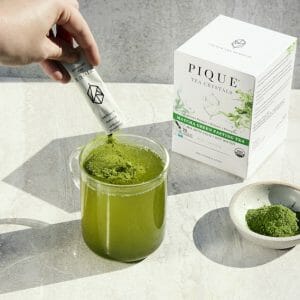
Pique Matcha Green Fasting Tea
Featuring the world’s best ceremonial grade matcha. Secret weapon to conquer the mental challenge of fasting. A mug full of zen.
Black Tea
Fun fact: black tea and green tea are derived from the exact same plant! The only difference is in how the tea leaves are processed. Black tea leaves are fermented, while green tea leaves are not.
While green tea has continually claimed all the attention of the health world, black tea is finally starting to get the recognition it is due, particularly because of its fermented properties. Most people don’t realize that black tea is a prebiotic, excellent for promoting balanced gut health!
The fermentation process means that black tea provides slightly less antioxidants than green tea, but it also means that black tea provides more caffeine.
So if you happen to find yourself a bit worn out with your new intermittent fasting regimen, or maybe just need a bit more energy (who doesn’t?!), black tea might be your new best friend.
Here’s our recommendation:
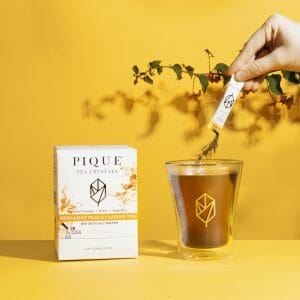
Pique Bergamot Black Fasting Tea
Bold, robust, and delightfully nuanced. Start your day with sun-kissed energy. Indulgent, yet still fast-approved.
Ginger Tea
A tea with added ginger is an excellent option while fasting. Ginger is well known for its ability to soothe an upset stomach, but drinking it can also help increase satiety. Ginger also has the added benefit of supporting your digestion and immune system. So you can be less hungry and stay healthier too!
Hibiscus Tea
Historically known as a beauty and vitality elixir, hibiscus tea is an excellent herbal option, for when you don’t want the caffeine boost that green and black teas will give you. Legend has it that Cleopatra drank hibiscus tea regularly for clear and glowing skin.
We think it’s the perfect option for the evenings, when you’re trying to keep from snacking before bedtime. Crisp and refreshing, with vitalizing antioxidants to boot.

How Much Tea Do I Need To Drink?
So can you just add a cup of tea to your daily intake and reap these benefits? Not quite.
Up until now, the health benefits of tea have remained hard to reach because you would need to brew and drink massive quantities every day in order to get the ideal amount of polyphenols and antioxidants.
But there’s a better way! New developments in tea-making have created a means to get all the benefits in just a couple cups per day. And it’s as easy as drinking water. Read on for more details.
-
The old way
In order to unlock the benefits found in tea, studies have shown you need to drink a minimum of 3 cups of high quality tea per day. This is based on the traditional way we are accustomed to brewing tea: in hot water.
Did you know that brewing anything (tea leaves, coffee beans) in hot water causes oxidation, which is essentially the same thing as rusting? Yuck!
That heat and oxidation actually destroy a substantial amount of the polyphenols and catechins that are responsible for the health benefits of tea.
-
The new way
Enter cold brewing. A cold brew process allows all those amazing polyphenols and catechins in tea leaves to be extracted without destroying them.
In fact, a cold-brewed cup of tea contains 2 to 3 times the antioxidants of a hot brewed cup. (10) That means you can drink one cup of cold brew and enjoy the benefits equivalent to 2-3 cups of hot brew.
Pique tea has revolutionized the tea market by introducing the world’s first cold-brewed tea crystals.
Wait — that doesn’t mean the drink is cold!
You can still enjoy a cup of hot cold-brewed tea! Sounds like an oxymoron, right?
A common misconception is that cold-brewing means a cold temperature drink. Here’s what actually happens: the tea leaves themselves are cold-brewed in order to extract all the amazing polyphenols and catechins and preserve them.
Pique Tea has perfected this process with their patented cold-brew crystallization technique, which transforms the cold-brewed tea into tea crystals that you can instantly dissolve in any temperature water.
Voila — super healthy and potent tea that’s as easy to drink as water! Check it out:
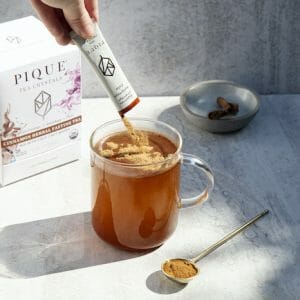
Pique Cinnamon Herbal Fasting Tea
Cozy, comforting and caffeine-free. Unwind your day with a hug in a mug. Almost forget you’re fasting.
Bottom Line
Look, fasting is not easy. Especially when you’re first starting out. No matter what fasting and eating pattern you choose, tTea just might be the difference that will help keep you in the fasted state for longer, and thus help you unlock the healthy potential within your own body! P.S. Don’t forget to also drink water, and even lemon water if you’d like.
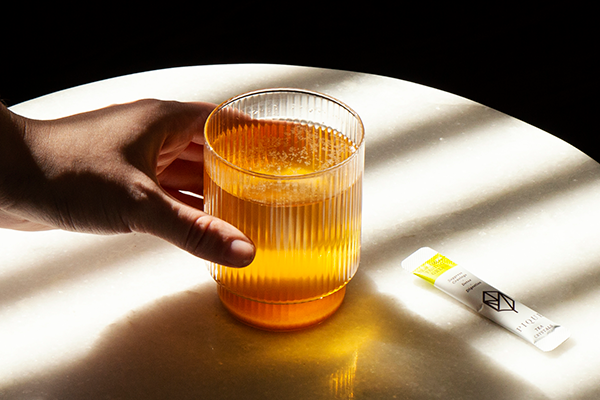

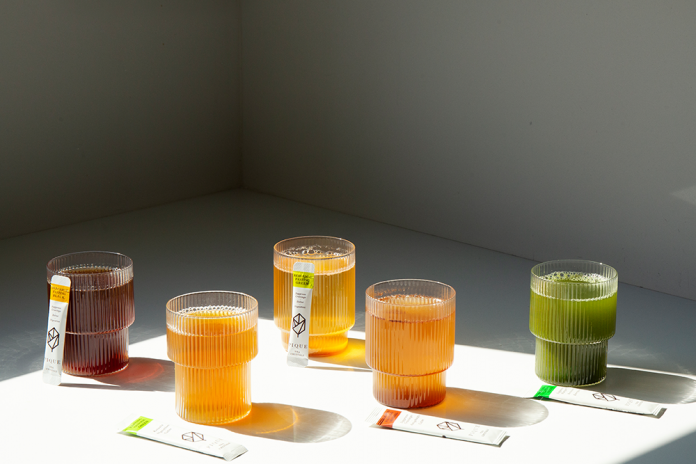


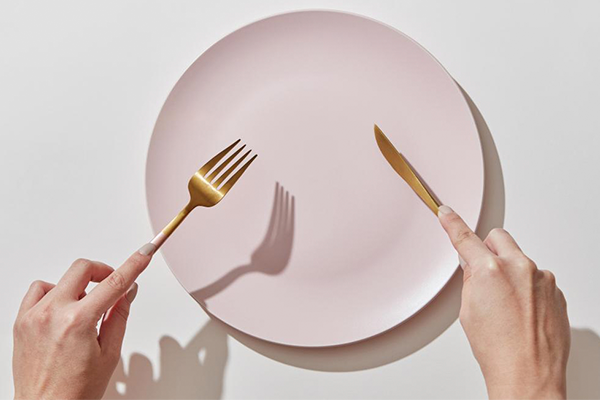
This particular tea really does make a difference when I fast….and I fast for 2-7 days at a time in addition to my daily restricted time eating window!
Wow! I really admire you. I desperately need to fast because of my high blood pressure and obesity but I am afraid to push myself to do it because they keep printing medical articles saying that it will damage the gall bladder. I have already had my appendix removed; therefore, I do not need to have my gall bladder removed as well because all organs serve a function and removing the gall bladder puts one at high risk of stomach cancer. Cancer runs in my family but high blood pressure does not. Can you explain more about your fast and about your eating window?
Removing the gall bladder does not increase your risk for stomach cancer- not sure where you heard that. However, being overweight does increase this risk. I am a cancer prevention researcher.
Thank you. Please feel free to send me information any time. I read that in a magazine but I don’t remember which one. I have known thin people who got cancer and died. What about garlic and fish oil?
Are you referring to the rooibos tea specifically, or the Pique Tea overall? I’m very interested in intermittent fasting, trying to learn as much as I can before I jump in…thanks!